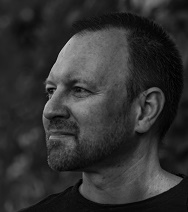 Piotr Oczko, PhD, Associate Professor, was born in Kraków in 1973. He studied English Philology (M.A. thesis: The Representations of Faust in English Romantic Literature , 1997) and Polish Philology (MA thesis: 'Chess' by Jan Kochanowski. Between the History of Literature and the History of the Game , 2000). In 1997 he received a translation award from the Ministry of Flemish Culture in Brussels, in 2000 he was granted a scholarship by Sasakawa Young Leaders Fellowship Fund and in 2006 he got a scholarship in the framework of Adam Krzyżanowski Fund. Moreover, in 2010 and 2014 he received the awards of the Rector of the Jagiellonian University.
Piotr Oczko, PhD, Associate Professor, was born in Kraków in 1973. He studied English Philology (M.A. thesis: The Representations of Faust in English Romantic Literature , 1997) and Polish Philology (MA thesis: 'Chess' by Jan Kochanowski. Between the History of Literature and the History of the Game , 2000). In 1997 he received a translation award from the Ministry of Flemish Culture in Brussels, in 2000 he was granted a scholarship by Sasakawa Young Leaders Fellowship Fund and in 2006 he got a scholarship in the framework of Adam Krzyżanowski Fund. Moreover, in 2010 and 2014 he received the awards of the Rector of the Jagiellonian University.
His doctoral dissertation, a comparative study on Joost van den Vondel’s Lucifer, was defended in 2002. He has conducted research at the universities of Leiden, Amsterdam, Utrecht, Nijmegen, Antwerp, London and Berlin and was a visiting professor at Charles University in Prague in 2006. His academic interests cover above all literature and culture of the Dutch-speaking countries; old Polish, English, and German literature; tragedy and the tragic in European literature up to the seventeenth century; medieval drama; literature and the question of evil; New Historicism; national identity and stereotypes; art history: seventeenth-century genre Dutch painting, functional arts and crafts of the seventeenth and nineteenth centuries, old Dutch pottery – especially tiles, emblem books; and LGBT studies.
Piotr Oczko has published ca. 100 papers and 9 books:
1. Holandia. Książka do pisania (Holland. A Book for Writing, 2019); 2. Holenderskie flizy na dawnych ziemiach polskich i ościennych (Dutch Tiles in the Polish-Lithuanian Commonwealth and Neighbouring Lands), vol. I: Umywalnia na Zamku Wysokim w Malborku. Jej historia i wystrój (The Lavabo at the High Castle in Malbork: Its History and Design, together with Jan Pluis, 2018); 3. Holenderskie flizy na dawnych ziemiach polskich i ościennych (Dutch Tiles in the Polish-Lithuanian Commonwealth and Neighbouring Lands), vol. II: Mody i wnętrza (Fashions and Interiors, 2018); 4. Gabinet Farfurowy w Pałacu w Wilanowie. Studium historyczno-ikonograficzne (The Faience Room in Wilanów Palace. A Study in Its History and Iconography – together with Jan Pluis, 2013); 5. Miotła i krzyż. Kultura sprzątania w dawnej Holandii, albo historia pewnej obsesji (A Broom and a Cross. The Culture of Cleanliness in Holland, or the History of an Obsession, 2013); 6. Homoseksualność staropolska (Old Polish Homosexuality – together with Tomasz Nastulczyk, 2012); 7. Życie i śmierć doktora Fausta, złego czarnoksiężnika, w literaturze angielskiej od wieku XVI po romantyzm (The Life and Death of Doctor Faustus, the Wicked Sorcerer, in English Literature from the Sixteenth Century to Romanticism, 2010); 8. W najdroższej Holandyjej… Szkice o siedemnastowiecznym dramacie i kulturze niderlandzkiej (In Holland Dearest… Essays on the Seventeenth-Century Dutch Drama and Culture, 2009); 9. Mit Lucyfera. Literackie dzieje Upadłego Anioła od starożytności po wiek XVII (The Myth of Lucifer: The Literary Representations of the Fallen Angel from the Antiquity to the Seventeenth Century, 2005).
Moreover, he was the editor and co-author of:
1. I See Wide Rivers… From the History of Old Dutch Literature (together with Jerzy Koch, 2018); 2. I See Wide Rivers… From the History of Dutch Literature of the 19th and 20th Century (together with Jerzy Koch, 2018); 3. Wspomnienia polskiego wygnańca/ The Remembrances of a Polish Exile (together with Jarosław Ławski, 2013); 4. CAMPania – zjawisko campu we współczesnej kulturze (CAMPaign – Camp in Modern Culture, 2008); 5. Słownik Sarmatyzmu. Idee, pojęcia, symbole (The Dictionary of Sarmatism: Ideas, Terms, Symbols, 2001).
Professor Piotr Oczko is the author of many papers on the history of Dutch and Polish literature and art, and a translator from English, German and Dutch into Polish (e.g. Mariken van Nieumeghen , 1998; Joost van den Vondel, Lucifer , 2002; B. Jezernik, Wilde Europe. The Balkans in the Gaze of Western Travellers , 2007; J. Huizinga, Dutch Civilisation in the 17th Century and Other Essays , 2008; F. Westerman, Ararat , 2009, Notes amsterdamski – Amsterdam Notebook , 2016).
He is a member of CODART, an international network for art historians and curators of art from the Low Countries.
E-mail: piotrek.oczko@uj.edu.pl



